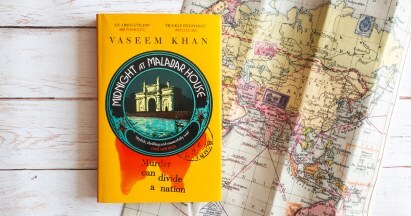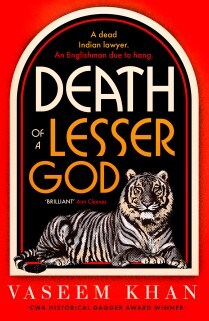A Wicked Welcome to Vaseem Khan!
by Julie, summering in Somerville
I am delighted to welcome Vaseem Khan to the blog today! Many of us had a chance to meet him at Malice Domestic this year, and perhaps be introduced to his Malabar House series or his Baby Ganesh Agency series, or to learn more about them. There’s a new book in the series coming out soon, so there’s time to catch up.
An elephant in a crime novel?I wrote my first novel aged 17 – a comic fantasy. Even then I loved the notion of being a tweedy writer, a man of letters, admired, envied, a doyen of the literary establishment… I also thought it would be a good way to avoid having to get a real job. There was one small problem with my cunning plan… that first book was rubbish!
I wrote six more novels across twenty-three years before finally being published at age 40 with The Unexpected Inheritance of Inspector Chopra, a crime novel about an Indian policeman who is forced into retirement in his forties and, while solving a murder, also has to deal with the unusual predicament of inheriting a one-year-old elephant. The book was a bestseller and picked by the UK Sunday Times as one of the 40 best crime novels published 2015-2020. Many readers tell me it’s the closest they’ve come to actually traveling to India!

Why the elephant? Though I was born and grew up in London, England, I lived in India for a decade in my twenties. One of the first sights I saw was that of an elephant swaying through the insanely congested traffic of a Mumbai road. That image stayed with me, so that when I returned to the UK, and decided to write about this incredible country, I knew an elephant had to be part of the cast.
After five books in that series (known as the Baby Ganesh Agency novels), I moved back in time to write a historical series set in 1950s India, written in a Golden Age style. The Malabar House novels were born of my desire to explore India just after Independence, when the modern India we see today was formed.
Beginning with Midnight at Malabar House, we witness a nation still reeling in the wake of Gandhi’s assassination and the horrors of Partition when a million Indians died in religious riots. My lead character, Persis, India’s first female police detective, is determined to prove herself in a man’s world, but is banished to Bombay’s smallest police station, Malabar House, populated by rejects and misfits. (The Times said: “Think Mick Herron in Bombay”!) And then the murder of an English diplomat falls into her lap, and she is forced to work with Archie Blackfinch, an English forensic scientist deputed to Bombay from the Met Police in London. It’s an uncomfortable, will they-won’t-they relationship. After all, how can an Indian woman in post-colonial India consider an Englishman as anything more than a colleague…?

I have readers all around the world and they are endlessly fascinated with India, both past and present. With each book I want to explore a particular theme – for me, that’s the challenge. For instance, the Malabar House novels are crime novels, but they allow me to slip in details to correct omissions and misconceptions from the British time in India. In The Lost Man of Bombay, the third in the series, a white man is found murdered in the Himalayan foothills with only a notebook in his pocket containing cryptic clues. In the book I mention that Mount Everest was named after a Welsh surveyor who worked in India. But George Everest never went near the mountain, nor determined that it was the world’s highest peak. An Indian named Radhanath Sikdar did that. Alas, you won’t find Sikdar’s name on any map. We often hear that history is written by the winners. It gives me great satisfaction to redress the balance!

My latest novel (out in the UK on 8 Aug) is Death of a Lesser God and asks a simple question – can post-colonial societies treat their former colonisers justly? James Whitby is an Englishman born in India during the Raj, convicted in post-Independence India of murdering a prominent Indian lawyer. He claims he is innocent, the victim of a form of ‘reverse racism’. Persis and Archie have eleven days to find out if Whitby is innocent or guilty before he is hanged. The clock is ticking!
Reader question: Do you enjoy learning about hidden history or facts you didn’t know when reading crime novels?
About the Author
Vaseem Khan is the author of two award-winning crime series set in India. His debut, The Unexpected Inheritance of Inspector Chopra, was a Sunday Times 40 best crime novels published 2015-2020 pick. In 2021, Midnight at Malabar House, the first in the Malabar House novels set in 1950s Bombay, won the Crime Writers Association Historical Dagger. In 2023, Vaseem was elected the Chair of the 70-year-old UK Crime Writers Association. Vaseem was born in England.
Website: http://vaseemkhan.com
Social media: Facebook: https://www.facebook.com/VaseemKhanOfficial/
Twitter: https://www.twitter.com/VaseemKhanUK
Instagram: https://www.instagram.com/vaseemkhanwriter/

Buy links to Amazon:
The Unexpected Inheritance of Inspector Chopra
Midnight at Malabar House
The Lost Man of Bombay
Death of a Lesser God
(Available for UK pre-order)



